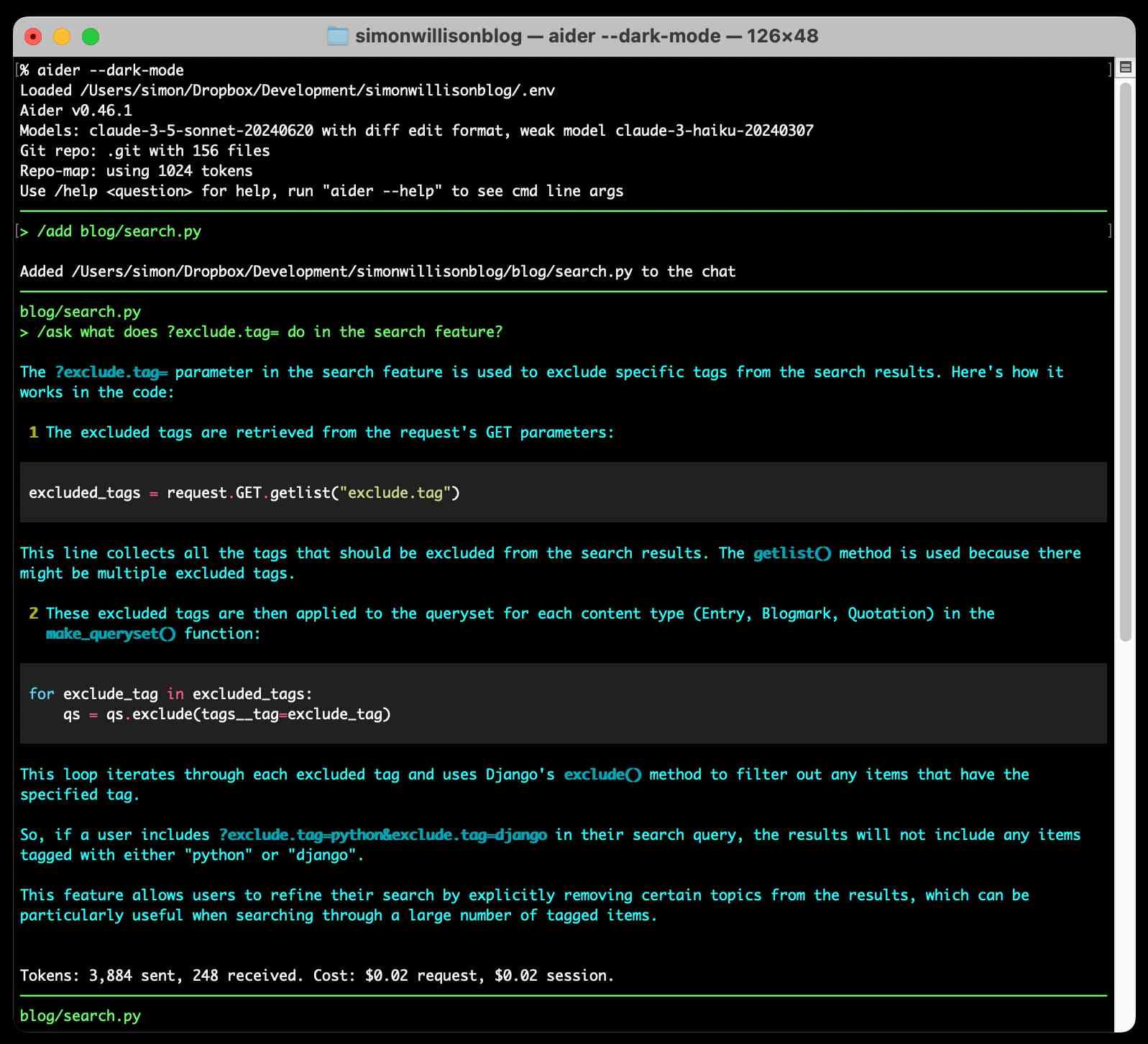Wednesday, 31st July 2024
Aider. Aider is an impressive open source local coding chat assistant terminal application, developed by Paul Gauthier (founding CTO of Inktomi back in 1996-2000).
I tried it out today, using an Anthropic API key to run it using Claude 3.5 Sonnet:
pipx install aider-chat
export ANTHROPIC_API_KEY=api-key-here
aider --dark-mode
I found the --dark-mode flag necessary to make it legible using the macOS terminal "Pro" theme.
Aider starts by generating a concise map of files in your current Git repository. This is passed to the LLM along with the prompts that you type, and Aider can then request additional files be added to that context - or you can add the manually with the /add filename command.
It defaults to making modifications to files and then committing them directly to Git with a generated commit message. I found myself preferring the /ask command which lets you ask a question without making any file modifications:
The Aider documentation includes extensive examples and the tool can work with a wide range of different LLMs, though it recommends GPT-4o, Claude 3.5 Sonnet (or 3 Opus) and DeepSeek Coder V2 for the best results. Aider maintains its own leaderboard, emphasizing that "Aider works best with LLMs which are good at editing code, not just good at writing code".
The prompts it uses are pretty fascinating - they're tucked away in various *_prompts.py files in aider/coders.
After giving it a lot of thought, we made the decision to discontinue new access to a small number of services, including AWS CodeCommit.
While we are no longer onboarding new customers to these services, there are no plans to change the features or experience you get today, including keeping them secure and reliable. [...]
The services I'm referring to are: S3 Select, CloudSearch, Cloud9, SimpleDB, Forecast, Data Pipeline, and CodeCommit.
This month in Servo: parallel tables and more (via) New in Servo:
Parallel table layout is now enabled (@mrobinson, #32477), spreading the work for laying out rows and their columns over all available CPU cores. This change is a great example of the strengths of Rayon and the opportunistic parallelism in Servo's layout engine.
The commit landing the change is quite short, and much of the work is done by refactoring the code to use .par_iter().enumerate().map(...) - par_iter() is the Rayon method that allows parallel iteration over a collection using multiple threads, hence multiple CPU cores.
Build your own SQS or Kafka with Postgres (via) Anthony Accomazzo works on Sequin, an open source "message stream" (similar to Kafka) written in Elixir and Go on top of PostgreSQL.
This detailed article describes how you can implement message queue patterns on PostgreSQL from scratch, including this neat example using a CTE, returning and for update skip locked to retrieve $1 messages from the messages table and simultaneously mark them with not_visible_until set to $2 in order to "lock" them for processing by a client:
with available_messages as (
select seq
from messages
where not_visible_until is null
or (not_visible_until <= now())
order by inserted_at
limit $1
for update skip locked
)
update messages m
set
not_visible_until = $2,
deliver_count = deliver_count + 1,
last_delivered_at = now(),
updated_at = now()
from available_messages am
where m.seq = am.seq
returning m.seq, m.data;
For the past 10 years or so, AWS has been rolling out these peripheral services at an astonishing rate, dozens every year. A few get traction, most don’t—but they all stick around, undead zombies behind impressive-looking marketing pages, because historically AWS just doesn’t make many breaking changes. [...]
AWS made this mess for themselves by rushing all sorts of half-baked services to market. The mess had to be cleaned up at some point, and they’re doing that. But now they’ve explicitly revealed something to customers: The new stuff we release isn’t guaranteed to stick around.
